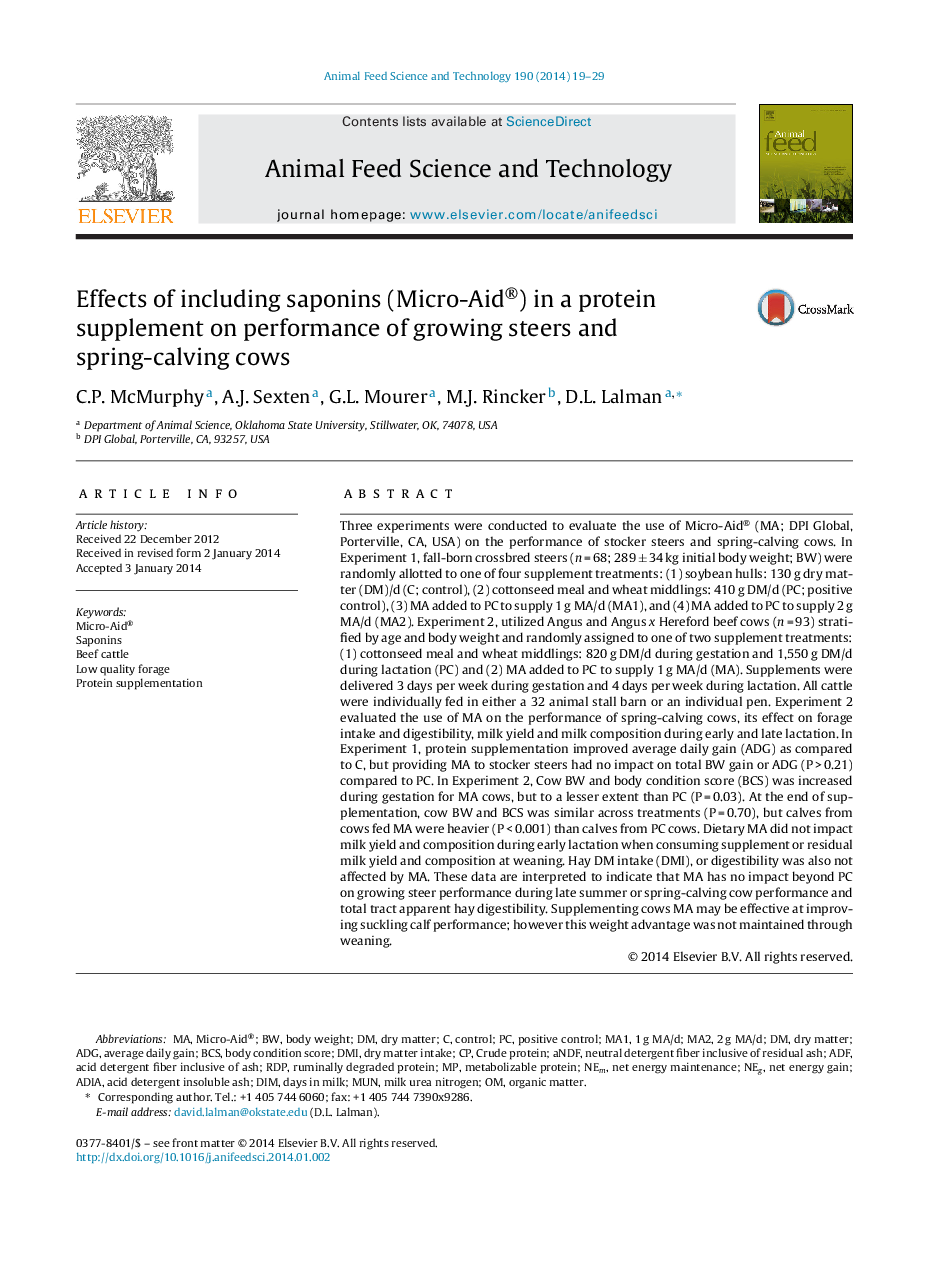| Article ID | Journal | Published Year | Pages | File Type |
|---|---|---|---|---|
| 8491703 | Animal Feed Science and Technology | 2014 | 11 Pages |
Abstract
Three experiments were conducted to evaluate the use of Micro-Aid® (MA; DPI Global, Porterville, CA, USA) on the performance of stocker steers and spring-calving cows. In Experiment 1, fall-born crossbred steers (n = 68; 289 ± 34 kg initial body weight; BW) were randomly allotted to one of four supplement treatments: (1) soybean hulls: 130 g dry matter (DM)/d (C; control), (2) cottonseed meal and wheat middlings: 410 g DM/d (PC; positive control), (3) MA added to PC to supply 1 g MA/d (MA1), and (4) MA added to PC to supply 2 g MA/d (MA2). Experiment 2, utilized Angus and Angus x Hereford beef cows (n = 93) stratified by age and body weight and randomly assigned to one of two supplement treatments: (1) cottonseed meal and wheat middlings: 820 g DM/d during gestation and 1,550 g DM/d during lactation (PC) and (2) MA added to PC to supply 1 g MA/d (MA). Supplements were delivered 3 days per week during gestation and 4 days per week during lactation. All cattle were individually fed in either a 32 animal stall barn or an individual pen. Experiment 2 evaluated the use of MA on the performance of spring-calving cows, its effect on forage intake and digestibility, milk yield and milk composition during early and late lactation. In Experiment 1, protein supplementation improved average daily gain (ADG) as compared to C, but providing MA to stocker steers had no impact on total BW gain or ADG (P > 0.21) compared to PC. In Experiment 2, Cow BW and body condition score (BCS) was increased during gestation for MA cows, but to a lesser extent than PC (P = 0.03). At the end of supplementation, cow BW and BCS was similar across treatments (P = 0.70), but calves from cows fed MA were heavier (P < 0.001) than calves from PC cows. Dietary MA did not impact milk yield and composition during early lactation when consuming supplement or residual milk yield and composition at weaning. Hay DM intake (DMI), or digestibility was also not affected by MA. These data are interpreted to indicate that MA has no impact beyond PC on growing steer performance during late summer or spring-calving cow performance and total tract apparent hay digestibility. Supplementing cows MA may be effective at improving suckling calf performance; however this weight advantage was not maintained through weaning.
Keywords
DMIADGMA2aNDFMUNADFRDPAdiaDIMNet energy gainacid detergent insoluble ashdays in milkBCsSaponinsorganic matterdry matteraverage daily gaindry matter intakeProtein supplementationBody condition scoreNEMnegMilk urea nitrogenbody weightcrude proteinmetabolizable proteinControlPositive controlBeef cattle
Related Topics
Life Sciences
Agricultural and Biological Sciences
Animal Science and Zoology
Authors
C.P. McMurphy, A.J. Sexten, G.L. Mourer, M.J. Rincker, D.L. Lalman,
